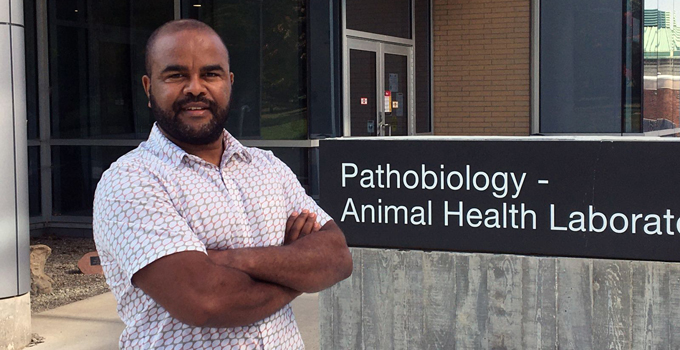
Researchers at the University of Guelph and McMaster University create combination immunotherapy approach to treat breast tumours and other cancers
Over the last few decades, scientists have made significant progress in harnessing the immune system to treat cancers. Despite these advances, many types of cancer can still evade the immune system and current immunotherapies. Dr. Sam Workenhe is developing better treatment options for patients with these hard-to-treat diseases.
In his recent study, published in Nature Communications Biology, Workenhe and collaborators at the University of Guelph and McMaster University discovered a new combination immunotherapy approach for breast tumours and other cancers. Their approach leverages cancer-killing viruses, called oncolytic viruses, and chemotherapy to trigger tumour inflammation, stimulating the body’s immune system to control tumour growth. Their combination leveraged the oncolytic virus, oHSV-1, and the chemotherapy agent, Mitomycin-C.
The research team demonstrated the effectiveness of this treatment approach in mouse models of breast cancer. They found that that mice treated with this combination therapy lived approximately two months longer than untreated ones – a significant difference relative to the short lifespan of these mouse models.
“Simply put, we wake up the immune system,” says Workenhe, Assistant Professor at the University of Guelph’s Ontario Veterinary College and an OICR Joseph and Wolf Lebovic Fellowship Program awardee. “Our study proves that aggressive tumours without immune cells can be made to render an immune response. Understanding how to design treatments that can potentially activate the immune system against cancer can revolutionize the current standards of care.”
Additionally, the study delineated the anticancer mechanisms of their approach, detailing how each element kickstarts an immune response against the tumours. Workenhe, who is a trained veterinarian and a virologist, is now applying these findings to further study immune responses and inflammatory cell death in tumours.
“A lot of people are excited about engineering viruses to inflame the tumour and improve cancer treatment,” says Workenhe. “The implications of these findings for human cancer therapy may be huge.”
This post was adapted from a University of Guelph news story.
